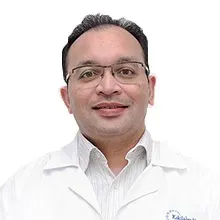About Doctor DR. SAMEER A. TULPULE
About
Dr. Sameer A. Tulpule is a hemo-oncologist and has more than 18 years of experience doing bone marrow transplants. His areas of specialization include bone marrow transplantation, autologous and
allogeneic stem cell transplantation, haploidentical transplants, treatment of multiple myeloma, leukemias, lymphomas, anemias such as thalassemia and polycythemia, high and low platelet counts, high and low white cell counts, bleeding and clotting disorders, haemato-oncology, myelodysplastic syndromes, and acute myeloid. Dr. Sameer earned his MBBS from the prestigious R. G. University Health Sciences, Bangalore, India's G.S. Medical College, and K.E.M. Hospital at the University of Bombay, India. He then earned his MD from the well-known JNMC and KLE Hospitals in Belgaum. Later, he completed his fellowship at the St. Thomas NHS Trust in London and his MRCP (UK) from the Royal College of Physicians, UK. He belongs to the American Society of Haematology, the British Society of Haematology, and the Indian Society of Haematology and Blood Transfusion. Additionally, he was actively invited to participate as a guest speaker on the topic of stem cell transplantation at scientific meetings, CMEs, and international conferences.
Work Experience
18 years of experience
Dr. Sameer Tulpule is an adult hematologist with more than 18 years of expertise. At the prestigious Guy's and St. Thomas' Hospital in London, he received his hematology training. He was a Consultant in myeloid diseases and stem cell transplantation at the Sheffield Teaching Hospitals NHS Foundation Trust in the United Kingdom before joining KDAH. In the areas of chronic myeloid leukemia, myeloproliferative diseases, and stem cell transplantation, he served as the South Yorkshire Network's principal physician. He has participated in the UK-NCRI Working Parties for both myeloproliferative diseases and chronic myeloid leukemia He has participated on a panel for the NHS England Cancer Drugs Fund. The largest stem cell registry in the UK, Anthony Nolan, employed Dr. Sameer Tulpule as a medical officer. While working at the Anthony Nolan Institute, he conducted stem cell transplant studies on the immune system after cord blood transplants and after donor lymphocyte infusions after allogeneic stem cell transplants.
Associated with Hospitals
List of Treatments
Dr. Sameer Tulpule is offering the following treatment procedures:
-
Osteosarcoma Treatment: Osteosarcoma is an uncommon bone malignancy. Amputation surgery is the treatment for osteosarcoma, in which a large local excision is used to eliminate the tumor. Tissue and bone removed from the patient's body may be replaced with a graft or an implant, such as artificial bone.
-
Tumors and Cysts: A cyst is a sac that can contain air, liquids, or other substances. Any portion of the body, including bones, organs, and soft tissues, can develop a cyst. Most cysts are noncancerous. Tumors are defined as any unwanted mass of cells or inflammation in the body. As compared to cysts, tumors are cancerous. Surgical procedures are often performed for the treatment or removal of cysts and tumors.
-
Giant Cell Tumor Treatment: Curettage is the most commonly utilized surgical treatment to treat giant cell tumors. Special devices are used to remove the tumor from the bone during curettage, after which a bone transplant is performed. The opening is filled with a bone transplant after curettage to strengthen the bone.
-
Chemotherapy for Solid Malignancies: Chemotherapy for solid malignancies is a treatment that uses drugs to destroy cancer cells. Because chemo affects the entire body, it can destroy cancer cells in the tumor as well as any cells that have broken out from it and traveled through the blood or lymph to another place
-
Melanoma Treatment: Disorders of the tumor cells are also known as melanoma. The primary therapy for melanoma is surgical removal of the original melanoma on the skin, known as excision. The extremeness of surgery is determined by the width of the melanoma. Most melanomas are discovered when they are less than 1.0 mm thick, and minimally invasive treatment is frequently required in this condition.
-
Lung Cancer Treatment: Lung cancer is a kind of cancer that develops in lung tissues, most commonly in the cells that line the passageways into the lungs. Surgery, including chemotherapy, radiation therapy, targeted therapy, or a combination of these, may be used to treat it. Small-cell lung cancer is often treated with radiation therapy.
-
Childhood Bone and Soft Tissue Tumors: There are many types of bone and soft tissue tumors in children, of which osteosarcoma is the most frequent kind of bone cancer, accounting for around 3% of all malignancies in children. Treatment includes minor surgical procedures to remove the tumor cells.
-
Oral Cancer Treatment: Oral cancers can form on the tongue, the tissue that covers the mouth and lips, beneath the tongue, at the base of the tongue, and in the neck area towards the back of the mouth. Treatment for oral cancer includes a combination of surgery, radiotherapy, or chemotherapy.
Minimally Invasive Surgery: Minimally invasive surgeries are those surgical procedures that do not require any kind of major incisions in the body. To perform the procedure, tiny surgical instruments are placed into additional
Education and Training
-
FRCPath, Royal college of Pathologists, UK
-
MRCP (UK): Royal College of Physicians, UK
-
MD (Med): JNMC and KLE Hospital, Belgaum R. G. University Health Sciences, Bangalore, India
-
MBBS: Seth G.S. Medical College and K.E.M. Hospital, University of Bombay, India
Trainings/Specializations
Membership
-
Indian Society of Haematology and Blood transfusion
-
British Society of Haematology
-
American Society of Haematology
Special Interest
 Associated with hospitals
Associated with hospitals
Envisioning the goals & paving the path to success for the organization.
Book Appoinment












